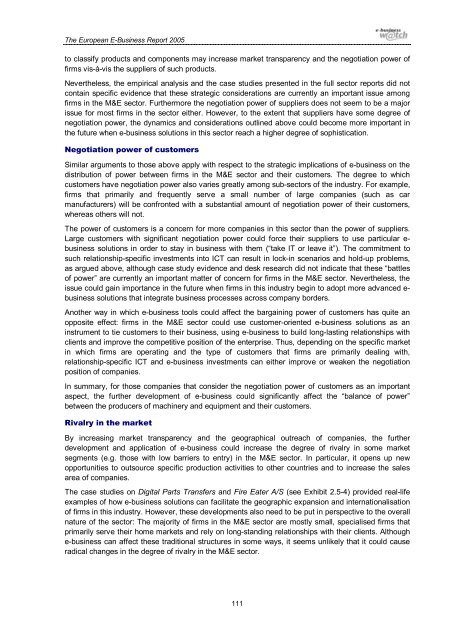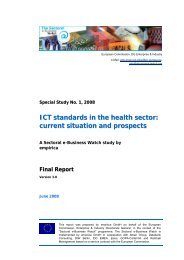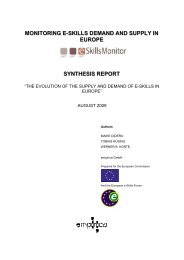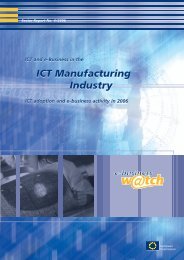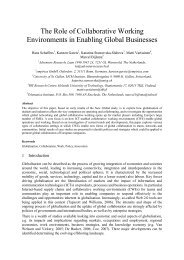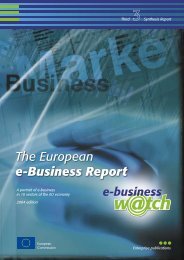The European e-Business Report The European e ... - empirica
The European e-Business Report The European e ... - empirica
The European e-Business Report The European e ... - empirica
You also want an ePaper? Increase the reach of your titles
YUMPU automatically turns print PDFs into web optimized ePapers that Google loves.
<strong>The</strong> <strong>European</strong> E-<strong>Business</strong> <strong>Report</strong> 2005<br />
to classify products and components may increase market transparency and the negotiation power of<br />
firms vis-à-vis the suppliers of such products.<br />
Nevertheless, the <strong>empirica</strong>l analysis and the case studies presented in the full sector reports did not<br />
contain specific evidence that these strategic considerations are currently an important issue among<br />
firms in the M&E sector. Furthermore the negotiation power of suppliers does not seem to be a major<br />
issue for most firms in the sector either. However, to the extent that suppliers have some degree of<br />
negotiation power, the dynamics and considerations outlined above could become more important in<br />
the future when e-business solutions in this sector reach a higher degree of sophistication.<br />
Negotiation power of customers<br />
Similar arguments to those above apply with respect to the strategic implications of e-business on the<br />
distribution of power between firms in the M&E sector and their customers. <strong>The</strong> degree to which<br />
customers have negotiation power also varies greatly among sub-sectors of the industry. For example,<br />
firms that primarily and frequently serve a small number of large companies (such as car<br />
manufacturers) will be confronted with a substantial amount of negotiation power of their customers,<br />
whereas others will not.<br />
<strong>The</strong> power of customers is a concern for more companies in this sector than the power of suppliers.<br />
Large customers with significant negotiation power could force their suppliers to use particular e-<br />
business solutions in order to stay in business with them (“take IT or leave it”). <strong>The</strong> commitment to<br />
such relationship-specific investments into ICT can result in lock-in scenarios and hold-up problems,<br />
as argued above, although case study evidence and desk research did not indicate that these “battles<br />
of power” are currently an important matter of concern for firms in the M&E sector. Nevertheless, the<br />
issue could gain importance in the future when firms in this industry begin to adopt more advanced e-<br />
business solutions that integrate business processes across company borders.<br />
Another way in which e-business tools could affect the bargaining power of customers has quite an<br />
opposite effect: firms in the M&E sector could use customer-oriented e-business solutions as an<br />
instrument to tie customers to their business, using e-business to build long-lasting relationships with<br />
clients and improve the competitive position of the enterprise. Thus, depending on the specific market<br />
in which firms are operating and the type of customers that firms are primarily dealing with,<br />
relationship-specific ICT and e-business investments can either improve or weaken the negotiation<br />
position of companies.<br />
In summary, for those companies that consider the negotiation power of customers as an important<br />
aspect, the further development of e-business could significantly affect the “balance of power”<br />
between the producers of machinery and equipment and their customers.<br />
Rivalry in the market<br />
By increasing market transparency and the geographical outreach of companies, the further<br />
development and application of e-business could increase the degree of rivalry in some market<br />
segments (e.g. those with low barriers to entry) in the M&E sector. In particular, it opens up new<br />
opportunities to outsource specific production activities to other countries and to increase the sales<br />
area of companies.<br />
<strong>The</strong> case studies on Digital Parts Transfers and Fire Eater A/S (see Exhibit 2.5-4) provided real-life<br />
examples of how e-business solutions can facilitate the geographic expansion and internationalisation<br />
of firms in this industry. However, these developments also need to be put in perspective to the overall<br />
nature of the sector: <strong>The</strong> majority of firms in the M&E sector are mostly small, specialised firms that<br />
primarily serve their home markets and rely on long-standing relationships with their clients. Although<br />
e-business can affect these traditional structures in some ways, it seems unlikely that it could cause<br />
radical changes in the degree of rivalry in the M&E sector.<br />
111


